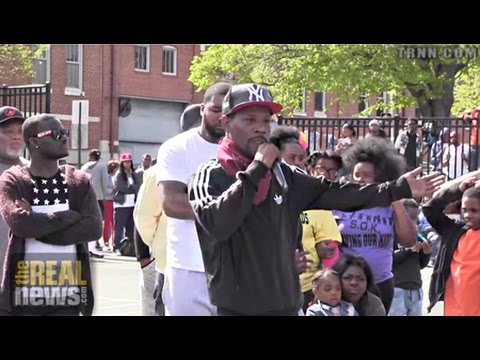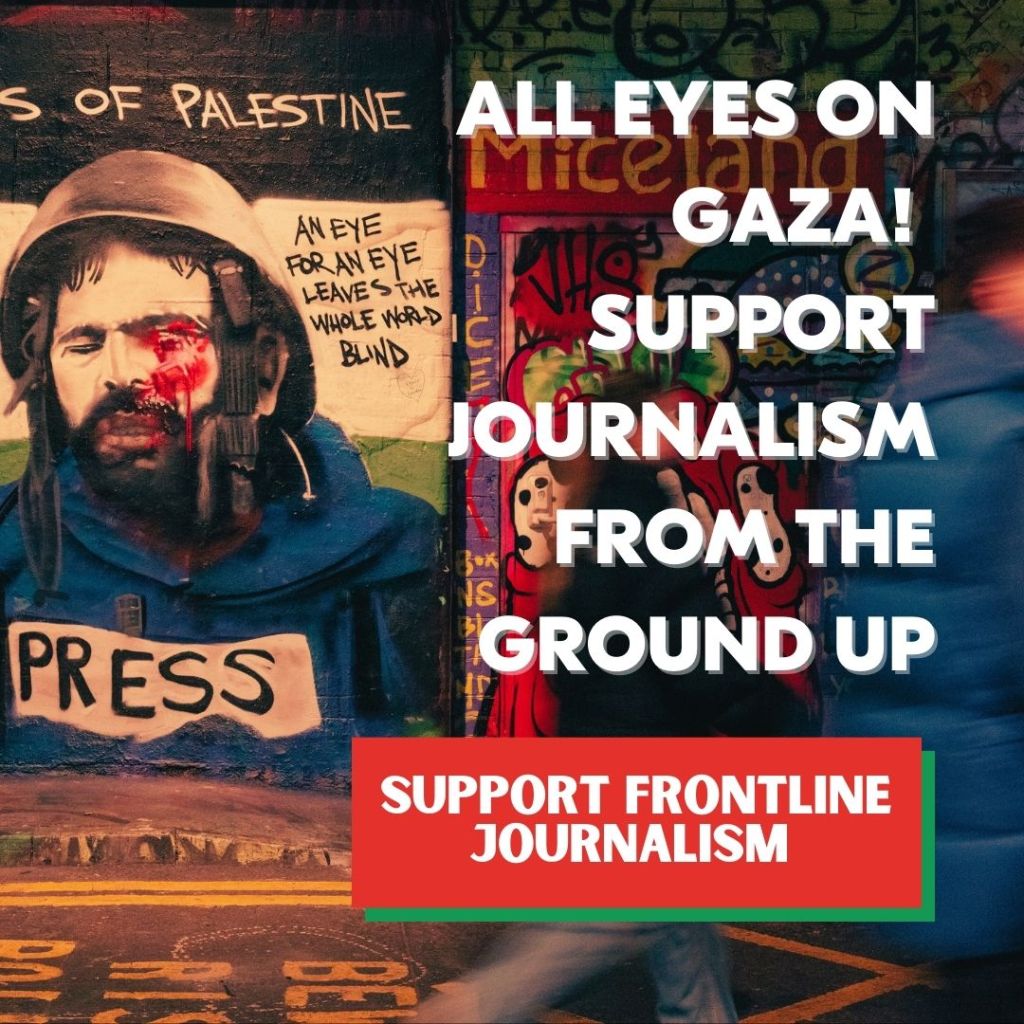
Lutalo Tyehimba, Marisela Gomez, and A. Dwight Pettit discuss the next steps for activists and the community in Baltimore
Host: Jessica Devereaux
Field Reporter: Angel Elliot
Production: David Hebden, Adam Coley
Story Transcript
ANGEL ELLIOTT, REPORTER, TRNN: I’m Angel Elliott for The Real News Network in Baltimore, and I’m here at the Cloverdale basketball court where organizations who are normally associated with violence and depravity in the city have come together for a positive day of food and fun for kids in the city. I’m talking about the Black Guerrilla Family. I’m talking about Bloods. I’m talking about Crips. I actually talked to them today about how they’re being portrayed in the media and what they want for Baltimore City going forward.
– They’re not showing all the good we’re doing. They’re not showing you, filming the stores that we protected. They’re not showing the cameraman and a lot of individuals we protected. They’re not showing that. – We just want justice for Freddie and Trayvon Martin and, you know, for them to stop doing what they’re doing to us. And then they won’t have the reaction that they have across the city and across the world. – I’m Crip, yeah, but that don’t mean nothing. Colors don’t make the man. The man make [you]. – I have kids of my own. And I want to make sure that when they grow up, they won’t become a Freddie Gray. They won’t be a Mike Brown. They won’t be another innocent bystander in the midst of anything that’s going on. People do what they did because they wanted to show there is a problem. Now that you see the problem, now that it’s publicized, it’s about what is you going to do about the problem? We all out here, we all see a color. At the end of the day I’m a woman, I’m a mother, I am a worker. I am a citizen. I pay taxes just like the next man. ELLIOTT: So I’m a Baltimore native just like you. I grew up here, my parents are from here. How does it make you feel when mainstream media comes into our city and projects it in a way that’s just not true? – The things that the media is putting all over the Internet and stuff like that, even though they’re making us look bad, we still got people out there that believe in us. People out there that supporting us and having faith in us and knowing that that’s not what we’re doing, and that’s not what we’re about and what we’re trying to do. We’re trying to help everybody. We coming together. These are my brothers, whatever–I’m colorblind. These are my brothers. These are my sisters. They are my family, whether you came from my mother or father or not, whether you are my bloodline or not. You are my family. We supposed to be coming together to protect and build what’s ours into what we believe in. – Don’t let historical differences between Crips and Bloods and [inaud.] stand in the way of anything. We here. We were here. We got oppressed by the police. Everybody out here got oppressed by the police yesterday. Don’t let historical differences between us stop y’all from uniting, because right here we’re united. And that’s how it’s going to stay. – When I was 15 years old yeah, I made a bad decision of being a gang member, but that was my decision. So but at the same time, this is all the right reasons. All the right reasons and all the wrong reasons of doing what you decide to do. But at the same time, this is the time that everybody need to come together and get their word across nationwide. I mean, Baltimore City is not a bad place. But at the same time people in Baltimore make bad decisions. They came to Baltimore City and messed up their own city. What you got now? You ain’t got no check cashing place, you ain’t got no CVS to go get your medicine. Where you going to go at? – You need to make sure all these people know that this is also not a racial issue. This is about people in poverty and people that are oppressed, regardless of what color you are. We have white Bloods. We have white Crips. It’s not about color. It’s not about race. – We don’t need the police to protect our neighborhood because we protect our own. And that’s simple. – ‘Cause they’re not protecting us, they’re [inaud.] They didn’t want to see us to come together. They did not want to see us come together. – And we’re not trying to kill the cops, man. We’re not trying to kill the cops. [Crosstalk] – That’s a lie. That’s a lie. There was never no threat against the cops. Never. – Never. – They made that up. – If that was the case then it would be police is there right now. We was directing traffic, we was taking little babies that was lost back to their mothers and fathers. We were directing traffic. You know, we was protecting cameramen that was getting beat up. Getting them to safety. But that’s not what they’re showing. – They don’t tell you that. – They showing the riots. [Crosstalk] – I got the video with all of that. – Right. They won’t tell you about all the good that’s going on. They won’t tell you about all the good that we doing.
ELLIOTT: From Cloverdale basketball court in Baltimore City, I’m Angel Elliott.
JESSICA DESVARIEUX, PRODUCER, TRNN: That was Angel Elliott coming to you from the streets of Baltimore. Now we’re back in studio and we have a new panel. Thank you all for joining us. I’m going to first start off with some introductions. To my right is A. Dwight Pettit. He was on yesterday, Baltimore civil rights attorney. And then we have Marisela Gomez, a public health scholar, activist, and author, and has been on The Real News previously. And also we have Lutalo Tyehimba. He is an outreach committee–Ujima? Did I pronounce that right? LUTALO TYEHIMBA: You did pronounce it correct. Ujima People’s Party. DESVARIEUX: Okay. Ujima People’s Party. Thank you all for joining us. So this panel, just so the viewers understand, we want to talk about what the community can do now because there’s so much momentum. There’s so much energy here in Baltimore. And what we’re going to first talk about is what people are doing now, and then we’ll get a little bit more into historical stuff and explain why we even have to be having this discussion in the first place. So I’m going to first start off with you, Lutalo. What is the community doing now? TYEHIMBA: Well, my organization is doing–Ujima People’s Progress Party–directing people towards independent political action. DESVARIEUX: Okay, what does that mean? TYEHIMBA: We’re planning, for example, we’re planning a statewide conference on May 2nd at Coppin State University from 8:30 AM to 4:30 PM. And this is, we’re planning to be Maryland’s first independent black political party. A statewide electoral party. And we have a drive, a signature drive to accumulate the 10,000 signatures that we need to achieve ballot status. A statewide party, organizing in Baltimore City and outlying counties. DESVARIEUX: What will be your platform? What are you guys really running on? TYEHIMBA: A couple things that are, we have–fighting for what we call a living wage. And we’re fighting for citizen’s control over power lines to stop some of the exorbitant rates that our people are getting and expose the Public Service Commission for their relationship with Baltimore gangster, energy, enterprise, or whatever you want to call it. And fighting for–another thing, trying to deal with this whole prison pipeline. This foster care to prison pipeline. And we think it’s very necessary to direct people to independent political action right now because I think the African working class or black working class, and poor people, and in general in America suffer very harshly economically and politically. And so we want to engage politically our socially disenfranchised, working class, suffering a heavy toll. Especially with the police brutality issues going on. I could say more about that if you want, but–. DESVARIEUX: Yeah. Yeah. Let’s talk about more of this disenfranchisement. Marisela, give us some history, as briefly as you possibly can, as to how did we even get here? MARISELA GOMEZ: It’s a great question, and I’m so happy that–well, first of all thank you for inviting me. I’m always very happy to, pleased to be here with The Real News Network, because you all are really getting into the meaning of what we need to do to have change. This is not a one-time event. You know, like I’ve been writing, Baltimore hasn’t been burning for two days. Baltimore has been burning for decades, right? This is–you know, the popular media is putting this story as if this is just happenstance. This is just one black man who happened to be one of many. But we have a history here of racism, of white supremacy, of classism, of neoliberalism. What does that all mean? That means that we have been disinvesting, abandoning our communities of color systematically. We have been leaving a whole group of people behind while we’ve been investing and promoting the betterment, the competitiveness, the productivity of a certain group of people who happen to be lighter-skinned and have more access to resources. And what you do is you then create two populations. We have two populations in America. We have one that don’t have, and we have one that have. And what we do is we congregate and segregate the ones who don’t have. And then what you do when you do that is people turn inward. We have fracturedness. We have fragmentation. And so what does the city–what do city governments do to address the disinvestment of resources, of education, or recreational centers, of technical skill training, what do they do? Instead of investing in those resources and those systems so people can prepare themselves for a vital life, what do they do? They send in police. They increase the budgets of police forces. They put millions into budgets. D.C. just turned, just said they’re putting more than $2 million into the police department. So why aren’t we using those funds, those kinds of funds in Baltimore, D.C., New York, to reinvest in our communities, schools, recreation centers? DESVARIEUX: I heard this amazing statistic, it was something like Baltimore Police Department gets 2.5 as many dollars than education. The education department. So their budget is 2.5 times greater than the education budget. I mean, if that’s not telling I don’t know what is. I’m going to turn to you, Dwight. Because what about the legal community? Because a lot of this has to do with the law. What can the legal community do to respond to this? A. DWIGHT PETTIT: Well, the legal community has been attempting to do its part in terms–especially police brutality. But what we have found is that the legislative bodies in various states, as well as the federal legislative body, the U.S. Congress, have made it more difficult to in fact pursue legal actions. The Supreme Court has constantly become more conservative in its rulings in terms of particularly police brutality. And so it’s become a very difficult area to litigate in. It’s expensive and what have you. But these problems are–I wrote a book, Under Color of Law, in which I talked about these things way before this recent event with Mr. Gray, because I’ve been handling these cases over the past 40 years, and the last 20 years you might say I’ve done over 50 to 100 police brutality cases. And it’s a terrible situation that it’s all been in Baltimore. But as I talked about in the book it’s a national problem. But Baltimore is the, is the perfect example of the ills as has just been indicated in the national spotlight. And those ills are education, the destruction of the urban education system. The criminal system, which in terms has become an industry. An economic industry in terms of mandatory sentences for nonviolent crimes and the disproportionate incarceration of African-American males. Everything that you can think of has been zeroed in in Baltimore as sort of the prime example of what’s the undercurrent and the underlying problems that are affecting this nation. As we’ve said, its not by accident in my opinion. It has been an intentional abandonment of poor people in this country. Jobs have moved out to Europe. Other parts of the world. They’re not here, they’ve been taken away, and people have been disallowed and cornered in terms of the urban areas without the proper educational facilities, without the opportunity for economic advancement. And so all of this is culminating–and we’re now seeing something on a national level that has just been boiling undercover since, you might say, as I think I mentioned to you yesterday, the great society under Lyndon Baines Johnson. And that was 55 years ago, and we’re still talking about the same thing, because it has gotten worse. DESVARIEUX: Yeah. And getting worse, though. How do we turn it around? I mean, there are people now organizing, and I’m going to just start with you, Dwight. How do you transform this from a moment into a movement? What should people be doing? PETTIT: Well, I think that what we’re seeing in the nation is, as unfortunate as those affairs are, it is the spark which is leading to the political situation and the rise of public attention to what has happened. And what this—I think what we have to do as progressive people, I don’t want to just say African-American people because the civil rights movement was a mixture of people, and it has to be today also if it’s going to be successful. But what we’re going to have to do, and especially in Baltimore City, coming up now. We’re coming up on 2016, which is a presidential election year. We’re going to also elect the mayor and what have you at the same time. So I think we have to formulate an agenda of what it is that we are specifically asking for in terms of legislators, in terms of elected officials. Because we don’t have the economics or the money wherewithal, monetary wherewithal to affect the political situation, but we do have the numbers. If we can focus like a laser beam on the political agenda, what we want for the communities, what we want for the underprivileged communities and then isolate and target those individuals that we believe we can lay this agenda out to and get commitments from, and then hold them to that political agenda in terms–if we provide the momentum to have them elected. DESVARIEUX: How do you activate–I think a population, I’m just going to say, as apathetic–and I don’t say that lightly, because in the last mayoral, two mayoral elections, only about 22-23 percent of Baltimore’s eligible voters turned up. So–. PETTIT: That’s why I made reverence to this being a presidential election. All the stars are lined up at this point in time, especially for Baltimore, Maryland, because it is a–how that happened is another political story which I won’t get into, but it happened. And so there will be no excuse for voter turnout and voter participation because we do come out as a people for presidential elections. So the voters should be able–. DESVARIEUX: What are the stats like for presidential elections? I’m, I’m not–. PETTIT: Well, the presidential election, I can’t give you the exact stats. It’s much higher, of course, than local elections. The last major presidential election, of course, was Mr. Obama. President Obama. And the turnouts were obvious. People were lined up in the streets to get–we have to keep that same incentive and that same momentum, because everything is on the line for the upcoming generation. DESVARIEUX: Okay, all right. Well, we’re going to talk about all of this and we’re going to really break down what organizers can be doing, what are their rights and all of that in our next segment. But we also have a package for our audience, so this package–it’s an interview and–just take a look at it. It really breaks down the cost of incarceration in Baltimore. Take a look.
End
DISCLAIMER: Please note that transcripts for The Real News Network are typed from a recording of the program. TRNN cannot guarantee their complete accuracy.



